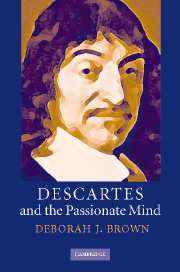Book contents
- Frontmatter
- Contents
- Acknowledgements
- Note on references
- Introduction
- 1 Volo ergo sum: the unity and significance of Les Passions de l'âme
- 2 Perturbations or sweet pleasures? Descartes' place in two traditions regarding the passions
- 3 The natural integration of reason and passion
- 4 Representing and referring
- 5 Action and passion: metaphysical integrationism
- 6 Wonder and love: extending the boundaries of the Cartesian knower and the Cartesian self
- 7 Several strange passages on desire and fortune
- 8 Generosity breeds content: self-mastery through self-esteem
- Bibliography
- Index
7 - Several strange passages on desire and fortune
Published online by Cambridge University Press: 15 December 2009
- Frontmatter
- Contents
- Acknowledgements
- Note on references
- Introduction
- 1 Volo ergo sum: the unity and significance of Les Passions de l'âme
- 2 Perturbations or sweet pleasures? Descartes' place in two traditions regarding the passions
- 3 The natural integration of reason and passion
- 4 Representing and referring
- 5 Action and passion: metaphysical integrationism
- 6 Wonder and love: extending the boundaries of the Cartesian knower and the Cartesian self
- 7 Several strange passages on desire and fortune
- 8 Generosity breeds content: self-mastery through self-esteem
- Bibliography
- Index
Summary
‘Now I know,’ she said, ‘that other, more serious cause of your sickness: you have forgotten what you are. So I really understand why you are ill and how to cure you. For because you are wandering, forgetful of your real self, you grieve that you are an exile and stripped of your goods; since indeed you do not know the goal and end of all things, you think that evil and wicked men are fortunate and powerful; since indeed you have forgotten what sort of governance the world is guided by, you think these fluctuations of fortune uncontrolled. All these are quite enough to cause not merely sickness but even death. But I thank the author of all health that you have not yet wholly lost your true nature. The best kindler of your health we have is your true opinion of the governance of the world, that you believe it to be subject not to the randomness of chance events but to divine reason: do not be afraid, then, for presently out of this tiny spark your vital warmth will glow again.
(Boethius, Consolatio, i. Prose 6)Recent debates about the nature of rational action have tended to take for their starting point a certain model, referred to as the belief-desire model. On Donald Davidson's account, rational action is behaviour that has conjointly a desire or ‘pro-attitude’ towards a certain end and a belief about the means to obtaining the end as its significant cause (Davidson, 1963).
- Type
- Chapter
- Information
- Descartes and the Passionate Mind , pp. 165 - 187Publisher: Cambridge University PressPrint publication year: 2006



